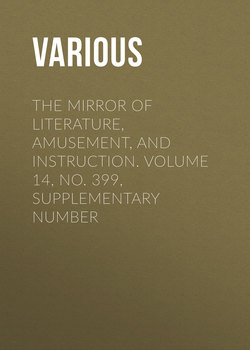The Mirror of Literature, Amusement, and Instruction. Volume 14, No. 399, Supplementary Number

Реклама. ООО «ЛитРес», ИНН: 7719571260.
Оглавление
Various. The Mirror of Literature, Amusement, and Instruction. Volume 14, No. 399, Supplementary Number
Verona
SPIRIT OF THE ANNUALS FOR 1830
VERONA
Friendship's Offering
LUCIFER
The Amulet
A CASTLE IN THE AIR
The Literary Souvenir
THE CONFESSION
Отрывок из книги
Fair and gentle readers, we present you with a kaleidoscopic view of some of these elegant trifles—the very bijouterie of art and literature—in picture outmastering each other in gems of ingenuity, and in print, exalting a thousand beautiful fancies into a halo of harmony and happiness for the coming year. We call these "trifles," but in the best sense of the term—ay, the air-plants of literature, whose light flowers and fancies shoot up and entwine with our best affections, and even lend a charm to the loveliest of their objects.
We commence with
.....
The Visconti did not long rule in Verona: about the year 1405, the Veronese placed themselves under the protection of Venice, whose good and ill fortune they partook of, until the period of the French Revolution, when, in 1796, the Venetian Republic ceased to exist. In 1798, the German army occupied Verona, and thought itself secure behind walls which had stood against Catinat, and which had been improved and strengthened by Prince Eugene; but, in 1801, it fell into the hands of the French, and became part of the kingdom of Italy. The events of 1814 placed the Veronese under the dominion of Austria; and, in 1822, this ancient capital of the North of Italy was the scene of a congress, wherein the divisions of Europe were remodelled, and its proportions changed in a manner that it is to be hoped will, in the end, conduce to its prosperity. Never had such a royal meeting taken place since the days of Theodoric, whose companions were princes from every nation on earth.
But they looked on the ruins of Verona. The Roman Amphitheatre is, perhaps, the least injured of all the public buildings. On the walls, the four bridges, the castles, and even the churches, the havoc of mines and the disfiguring effects of bullets are every where visible. The poverty that war leaves behind is to be seen in the neglected state of the public buildings, the substitution of gilded and silvered wood for the sacred golden candlesticks of the altar, and the destruction or disappearance of pictures of great price. Yet enough remains to show that Verona once partook of the riches, the polish, the luxury of Venice. There are relics of her schools, and fragments of her beautiful architecture. From the Gothic times to the present, we may trace, step by step, the improvements and variations of public and private buildings. The majestic San Zeno is at the head of the churches: there is nothing but what is ancient, and nothing new or incongruous offends the eye. The Cathedral still preserves one of Titian's most precious works. In the portico are two figures in high relief, of white marble: on the sword of one is the word Durindarda; is this the effigy of Charlemagne's Orlando? The ancient church of San Fermo, restored in 1319, offers some of the earliest pictures after the first dawn of the revival of painting, by Stefano da Zevio. To the church of St. George, beyond the Adige, one of the great works of Paolo Veronese, which do so much honour to himself and to his native city, has been restored, after having been carried to Paris. Indeed, there is not one of the many churches of Verona which is not interesting on account of its antiquity, the works of art contained in it, or its story; and the public squares and lordly palaces, and the towers that once served as watch-towers to the proud nobles who guarded them, all force the spectator to look back with wonder and admiration to the times when a sentiment of political independence could produce such monuments of glory, even in the midst of war and in a petty state.
.....